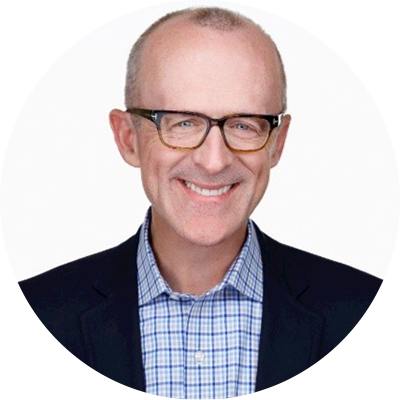marketing
rapport
Episode 9 –
How to Lead Through Challenging Times with Tim Fagan, SVP & Chief Revenue Officer at TEGNA
RESOURCES ❯ The Marketing Rapport Podcast
Episode Summary
When you decide to advertise on television, you will have to choose between broadcast, cable, and local channels. According to Encyclopedia.com, broadcast television is the most common form of television in the United States. Broadcast channels use the public airwaves to transmit programs that are theoretically available on any TV set within the range of the transmitter at no cost to the viewer.
But what’s the future of broadcast TV? Can it compete with online options?
In this episode of The Marketing Rapport, Tim Fagan, SVP & Chief Revenue Officer at TEGNA Inc., debunks some of the myths about the demise of broadcast TV. Tim and our host Tim Finnigan discuss the power of broadcast TV, the importance of storytelling, and how to lead through challenging times.
Guest-at-a-Glance

- Name: Tim Fagan
- What he does: Tim is the SVP & chief revenue officer at TEGNA Inc.
- Company: TEGNA Inc.
- Noteworthy: Tim graduated from the University of Notre Dame in the field of business administration and accounting and has done an MBA in finance and economics at The University of Chicago Booth School of Business. Tim is an experienced media and digital executive, and he is currently the chief revenue officer at TEGNA, an innovative media company with 64 television stations and one radio station in 51 markets. He also leads national digital solutions for advertisers looking to engage with a motivated local audience.
- Where to find Tim: LinkedIn | Website
Key Insights
- Broadcast television is not dead. The death of television was predicted more than ten years ago, but according to Tim, the reality is different. As he says, the Super Bowl is an example of the power of broadcast TV. “Live sports is an egregious example of what we like to call shared emotional experiences. 113 million Americans tuned into the big game; that number just continues to grow. Here we are, almost in the middle of March; March Madness is going to attract record audiences this year. People crave community. I think COVID had a part in that, and they want to experience these things together. So, it’s not dead.”
- How to keep sales and marketing involved in times of uncertainty? TEGNA was a public company, but more than a year ago, they announced that they were being taken private by a group. However, the deal still hasn’t received regulatory approval. According to Tim, that brings a lot of uncertainty and disrupts the operations of the organization, but leaders have to think about customers. “It’s easy to get distracted. Whether it’s what’s going on in the global economy, the fears of recession, what’s happening with our political divide, whatever it is, we just have to sit down, particularly with clients, and say, ‘This is what we think about your vertical, your business, and this is how we think we can help.’ And if we continue to just focus on that, not only will you advance the business further because you’re in it, but you’re just going to be happier. If you can go three days without thinking about something that you have no control over, you’re just happier. And so, we find people that are just more happy and executing on the things that they’re good at. You’re just going to get better outcomes.”
- The importance of storytelling. Although marketing and sales are separate activities, they cannot work independently of each other because they have the same goal — to bring in new customers. Marketing creates brand awareness and attracts potential clients; sales turn that awareness into purchases. Tim notes that many elements of that relationship create value, but storytelling gets to the heart of what strong B2B marketers can add to a sales organization. “Our most successful sellers are ones that can do the needs analysis, really understand fits in terms of media solutions and needs, but then ultimately, capture the trust of that client through a story that is not only believable, but also it’s one that is going to demonstrate value immediately, and then can grow from there.”
Episode Highlights
Tim as the Chief Revenue Officer at TEGNA
“As Chief Revenue Officer, I set the vision, and the framework, and the execution of our advertising businesses. So, we call our suite of products advertising and marketing services, so consumers may think of it as: we sell TV commercials on broadcast television. We sell video spots on our streaming platform on PREMION. We sell display products and video products on our websites, on our mobile apps, on our streaming apps, I mentioned our podcasting business. So it’s really getting advertisers to access our audiences through those various platforms.”
A Successful Salesperson Is Always Well-Prepared for a Sales Call
“We tell people, ‘Get exposed to as many things as you can when you’re out.’ In our business, we call into a lot of different verticals, so we might be a little broader than other businesses. We tell people, ‘If you’re in a vertical that you’re really comfortable with and become passionate about, really understand that vertical as deeply as you can.’
Back to storytelling, we had a room full of sellers, and there’s that famous Mark Twain quote, ‘I didn’t have enough time to write a short story, so I wrote a long one.’ And it’s really helping our younger sellers to say, ‘Just stop.’ Stop and think about whether you’re putting together a pitch deck, or your proverbial elevator pitch. Verbally, what are you going to do that’s going to help the receiving end of that conversation? What are you going to do that’s going to help them immediately? And we all get into this Bataan Death March of slides and 35-slide PowerPoint decks, and I think that’s always the wrong answer. It’s spending the time up front to think about the needs and to think about what’s going to help them immediately and that’s most relevant to them, and you’re going to find success.”
Cross-Country Running Can Be Applied to Business
“For cross-country teams to win a state championship, it helps if you have a really gifted runner or two, but the way the cross-country is scored is you run seven girls or boys, and the top five score. If you go downstate, in Illinois, you might have 50 schools running on a given day, so that’s 350 runners, and the first girl across the finish line gets one point, the second one gets two, and so on, and the lowest team score wins. You can’t win a championship if your third, fourth, or fifth runners are in the two hundreds of their score; you’re just not going to win. And those teams that prepare their runners to not only run as hard as they can and as strategically as they can but to think about the outcome of your third, fourth, and fifth runners, those are the teams that win championships. And as I think about our sales organization, we’ve got 50 stations, we’ve got a national sales team, we’ve got pockets of cross-country teams, and we’re always going to have the number one runner, the number two runner, but for us to achieve success is how do we level up those other runners, those other sellers to be successful.”
Top Quotes
[04:39] “It’s hard to have a vibrant community without a strong economy.”
[10:26] “Leaders are earning their paychecks right during times of adversity and uncertainty.”
[11:42] “Leaders need to remind colleagues: fall back in love with the business and try to focus on the things that you can control and that you can do for your customers.”
[18:23] “Don’t show up to a sales call without bringing something that’s going to be useful to them.”
[32:21] “Remember those old TV commercials — The More You Know — when you’re watching the afterschool specials in the 1970s. Well, I don’t know, but I’m going to find someone that can help us. And the more you know, the more successful you’ll be.”
The views, thoughts, and opinions expressed are those of the speaker and do not necessarily represent the views, thoughts, and opinions of Verisk Marketing Solutions or Verisk Analytics. The material and information presented here is for general information purposes only.
This podcast is not intended to replace legal or other professional advice. The Lead Intelligence, Inc. (dba Verisk Marketing Solutions) and Verisk Analytics LLC names and all forms and abbreviations are the property of its owner and its use does not imply endorsement of or opposition to any specific organization, product, or service.
VERISK MARKETING SOLUTIONS DISCLAIMS ALL LIABILITY ARISING OUT OF ANY INDIVIDUAL'S USE OF, REFERENCE TO, RELIANCE ON, OR INABILITY TO USE THIS PODCAST OR THE INFORMATION PRESENTED IN THIS PODCAST.



 Your Privacy Choices for Platform Services | Data Services
Your Privacy Choices for Platform Services | Data Services